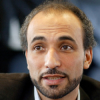Tariq Ramadan

Tariq Ramadan
Tariq Ramadanis a Swiss academic, philosopher and writer. He is the professor of Contemporary Islamic Studies in the Faculty of Oriental Studies at St Antony's College, Oxford and also teaches at the Oxford Faculty of Theology. He is a visiting professor at the Faculty of Islamic Studies, the Université Mundiapolisand several other universities around world. He is also a senior research fellow at Doshisha University. He is the director of the Research Centre of Islamic Legislation and Ethics, based in...
NationalitySwiss
ProfessionWriter
Date of Birth26 August 1962
CountrySwitzerland
If religious people deny paradise to their opponents or to 'non-believers,' atheists would likewise seek to eliminate 'dangerous' believers with their 'childish' ways and their heads in the clouds.
The young people who join extremist groups are clearly suffering from massive deficiencies in religious knowledge and are often politically gullible (when they are not attempting to salve pangs of conscience by cutting themselves off from a life of delinquency).
We should say to the West: "You have been supporting dictators for too many years. Don't expect the people to introduce democracy over night. It is going to take time." It took time with the French revolution, it took time with the Eastern European revolutions. And it is going to take time there.
No one can deny that some Islamist groups have credential and popularity. But that does not mean they are a majority. If we are serious about democracy we cannot blame the people for choosing what they want. We must promote the kinds of procedures and processes that are helping the people move ahead.
The media is putting a lot of emphasis on the few people that are destroying, while it won't report on the silent majority of people who are constructing, building and trying to find their way.
I don't think we should take the emotional reactions of a few people as more representative than those of the millions of people who took to the street in a non-violent way against dictators.
In 2012, those French Muslim people voted massively for Francois Hollande against Nicolas Sarkozy. With the results of elections getting even tighter, those votes can make the difference. I am obviously not in favour of a "community electorate," however, pressure is so great on them that I can easily understand how it can affect their votes.
Since the uprisings in the Middle East many scholars have come out saying that freedom comes first before the Shariah. There is also something important that we must keep in mind in our understanding the Shariah, and that is the room for what is permissible should be as wide as possible. So we should leave it open to let people be creative.
We need to acknowledge that there is a real issue with how the Scriptures are being interpreted. Whenever I am told that terrorists are not Muslim, I systematically reply that they actually are, and they cannot be marginalised, the same way they are marginalising other Muslim people. Scriptures are quoted even though their interpretations are twisted. In the face of misinterpretation the only way out would be using another interpretation of the Scriptures.
Things need to be properly named. Political confusion starts with terminology confusion. Islamism implies some sort of political and social plan for Muslim people. In that classification, we find different categories.
The problem with Salafis is that they are religiously sincere and politically naïve. And they allow themselves to be supported by people who have no religious sincerity but who are politically very smart, especially when it comes to their economic interests.
Still I have been invited I don't know how many times to Turkey, where Turkey has been following very quickly in the footsteps of what is sometimes referred to as the movement of cyber-dissidents. They have been training young people and also encouraging them to come into contact with western Muslims.
The West hasn't been naïve, it has been patronizing the South by imposing its own views on what should be done - ironically after having been so close and so supportive of dictators who were not respecting the people.
What you need to do is protect the structures and dynamics that are helping the people choose. The only thing that we can do is to respect the will of the people when it comes to majority processes. It is not for us to impose a model, it is not for us to impose answers to some critical questions.